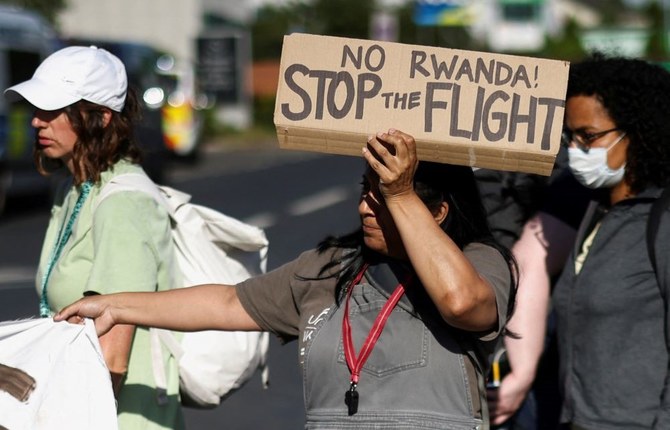LONDON: The UK home secretary is expected to be allowed to ignore rulings from the European Court of Human Rights on migrant deportations, government sources told The Guardian on Thursday.
Hard-right MPs have urged Prime Minister Rishi Sunak to toughen the illegal migration bill so that ministers can disregard ECHR rulings.
The law would include provisions that will prevent anyone who enters the UK illegally from seeking asylum, and will allow them to be held and deported.
According to government sources, an amendment to the bill will enable the home secretary to “disregard” interim rule 39 orders.
The ECHR granted 12 of 161 interim measures applications against the UK government between 2020 and 2022, The Guardian reported.
One of the Strasbourg court’s rule 39 injunctions last year prevented the government from deporting asylum applicants to Rwanda.
Another planned amendment to the new law will make it clear that the only option to prevent the deportation of refused asylum-seekers or criminals is to convince a British judge that doing so would cause “serious and irreversible harm,” sources told The Guardian.
The prime minister was believed to have initially resisted agreeing to ignore rulings from the ECHR, prompting the Rwanda removal plan to be postponed.
But according to government sources, Sunak told them he had “skin in the game, too” and that his premiership had vowed to halt the boats.
Although some Conservative MPs are pushing for the UK to leave the ECHR, they have taken a “tactical retreat” from prompting the government to do so before the next election, The Guardian reported
Removing the UK from the ECHR, whose rights were enshrined into UK law in 1998 with the Human Rights Act, is seen as problematic because the court was critical to the Good Friday Agreement, which secured peace in Northern Ireland.
John Thomas, the former lord chief justice of England and Wales, said the new amendments would likely amount to a “symbolic breach of the rule of law”.
He told The Guardian: “Many people would say having the power to ignore a court order is something [that], unless the circumstances were quite extraordinary, [that] this is a step a government should never take because it is symbolic of a breach of the rule of law.”


























